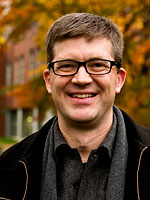Director Uses Experience to Shape Young Leaders
 As the director of Student Programs at Seattle Pacific University, Dale Anderson likes to say he’s come full circle.
As the director of Student Programs at Seattle Pacific University, Dale Anderson likes to say he’s come full circle.A theatre major at SPU in the mid-1980s, the young Anderson kept busy, especially through leadership in student organizations. In fact, many of the major events that SPU students enjoy and lead today — from Tradition, the annual Christmas festival held in Tiffany Loop, to the Talent Show, a Homecoming and Family Weekend mainstay — were formed during his time as the Student Union Board’s (STUB) student director of campus events.
“A strength of mine has always been to play well with others,” he says. “I love forming collaborative experiences. SPU allowed me to develop through those activities, and that really influenced who I am.”
This Time With a Twist
These days Anderson finds himself back on campus participating in major campus events — only this time as the full-time staff advisor guiding the efforts of student leaders. But he and his staff handle much more than events.Student Programs also oversees all department-affiliated student programs, such as the student ministry coordinator program and STUB; the activities of the Associated Students of Seattle Pacific (ASSP), SPU’s student government; all student clubs funded through ASSP; student orientation programs; and high ceremonial events such as Ivy Cutting, a graduation celebration held in Tiffany Loop.
That’s a full load for the fourth-year director. But he says he enjoys it. Especially his work as an advisor to the various student leaders on campus.
“The development and learning and character building that come from leadership opportunities are important,” Anderson explains. “Involvement benefits students as they emerge into adulthood, so I take my role seriously.”
A Different Type of Stage Direction
Students tend to develop in stages, he says. In high school they are often dependent; in college they discover independence and a “do-it-myself” attitude. But after college, the hope is they become “interdependent” and recognize that we are all connected and can often accomplish more working together.Part of his role is to honor their self-discovery while creating opportunities for the third stage to develop. It’s a delicate line to walk.
“I see myself as an educator living in the world of experiential learning,” he shares. “With experiential learning, compared to traditional learning models, the test comes first, then the learning. My job is to establish a safe environment in which student leaders are empowered to make major decisions — and to make mistakes. The key is that my staff and I are there to help them reflect and grow when decisions don’t work.”
It’s this last part that helps SPU maintain a robust student leadership program and a fertile learning environment. And that keeps students plugged in.
“I tell parents to encourage their sons and daughters to get involved,” says Anderson. “It’s a major factor in persistence and graduation rates for students. Plus, it makes for a richer experience.” And in some cases, such as with Anderson, it shapes a career path.
Read other stories in the Staff Story Archives


